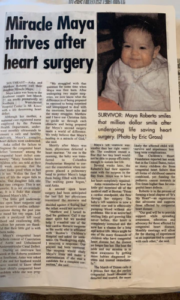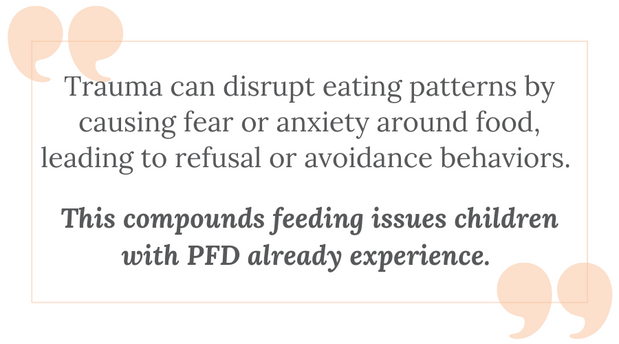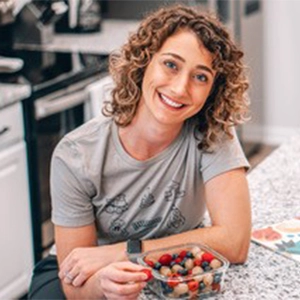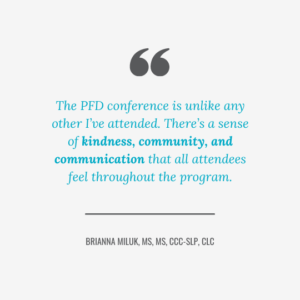Category: IPFDC
The Power of Trauma Informed Care for Children with Pediatric Feeding Disorders
Published by Feeding Matters on Apr 05, 2023
Of all the clinical appointments for 15-year-old Maya Roberto over the years, one stands out. Instead of catatonically going through the motions of her echocardiogram, Maya interacted with her cardiologist, even asking questions. Her mother, Dr. Anka Roberto, recalls how shocked she and her doctor were as Maya actively engaged with her cardiologist for the first time.
Noting that his patient, who was five years old at the time, was much more lively, the physician asked what had changed. Roberto, DNP, MPH, APRN, PMHNP-BC told him, she was in trauma therapy and just had an Eye Movement Desensitization and Reprocessing (EMDR) session to help her work through her medical trauma.
The doctor had never heard of it, and was pleasantly surprised with its efficacy.
Today, Roberto uses EMDR to help heal her pediatric patients from trauma as a private practice clinician.
Roberto’s years as a NICU nurse and mother of a child with complex congenital heart defects prepared her for a career in trauma-informed care as an advanced practice nurse. She’s seen personally and professionally how much treating a patient’s trauma as part of the continuum of care can make a difference.

Since birth, Maya’s journey has included multiple open heart surgeries, years of feeding therapy and an NG tube. Roberto knows firsthand how traumatic medical and feeding interventions can have a lasting impact. For children with pediatric feeding disorder (PFD), considering and treating medical trauma can go a long way toward healing children.
Trauma-informed care offers a comprehensive approach that considers emotional and mental well-being to help children and their families affected by PFD. Understanding the impact of trauma on the body and how to navigate it allows families to access an effective care modality.
Defining trauma
Trauma varies for everyone. One major incident or many minor insults can cause trauma. Two people experiencing the same situation can respond entirely differently. One can move forward, while the other carries a lasting physical and emotional imprint. “When I think about trauma, it’s more of an adversity,” says Roberto. “We could have a big trauma, or we can have little things that add up to carry the same weight of a big trauma.”
What matters is how trauma affects the brain and body.
The CDC-Kaiser Permanente Adverse Childhood Experiences (ACE) study is one of the most comprehensive investigations into the lasting effects of childhood trauma. The longitudinal study showed that early adversity could significantly impact future physical, social and emotional health – as well as lead to early mortality rates.
The pandemic further raised awareness of how trauma can affect mental and physical health.
How the body reacts to trauma
Trauma can profoundly affect the body. Potentially traumatic experiences trigger the body’s “fight or flight” response. In this state, the heart rate increases, and respiration speeds up as the sympathetic nervous system prepares to defend against danger.
The disruption of hormones and enzymes caused by the experience can lead to difficulty regulating temperature, breathing and digestion. The gastric emptying system turns off. It causes constipation, loss of appetite, and/or motility (muscles in the wall of the gut) issues.
“It’s like the fire alarm in the house is going off,” says Roberto. When this happens, the parasympathetic system, sometimes called the “rest and digest” system, stops working.
These acute responses can make an imprint that has long-term effects. Families of children with PFD can mitigate the impact of trauma with support and care. “Trauma leaves a mark, but it’s up to us to find those who can help us get out of being stuck in the triggered cycle,” says Roberto
Understanding trauma-informed care for children with PFD
Trauma-informed care is an approach to support those who have had adverse experiences during their lifetime. Unlike traditional forms of care, which may not be sensitive to traumatic experiences, trauma-informed care recognizes the impact of trauma on an individual’s behavior, thoughts and emotions. The goal is to create a safe space for healing and recovery.Trauma-informed care involves four key components, known as the “Four R’s:
- Realizing how trauma can affect an individual
- Recognizing signs an individual has experienced trauma
- Responding effectively with appropriate interventions
- Resisting re-traumatization by promoting safety, trust, empowerment and collaboration
Understanding these components is essential to effectively support children with PFD, who may be dealing with the long-term effects of traumatic experiences.
Trauma can disrupt eating patterns by causing fear or anxiety around food, leading to refusal or avoidance behaviors. This compounds feeding issues children with PFD already experience.

For children with PFD, trauma-informed care offers a safe way to explore emotions while helping them build positive relationships around eating.
How to navigate the impact of feeding trauma
The effects of trauma on children with PFD can be challenging. What’s traumatic to one child may barely register for another. And the traumatic experience often isn’t even something the child can recall.
This is why it’s crucial to understand each child’s experience, recognize triggers and provide emotional support. Therapeutic interventions such as EMDR can help children reprocess past traumas without needing to talk about them. In her practice, Roberto uses a sand tray and play therapy to help children process previous experiences and feelings.
“They may not have verbal recall and a story to tell, but they remember feeling a certain way,” she says.
A child’s visit to a doctor’s office, for example, can trigger a panic attack because they don’t want to lie on the table, says Roberto. “It’s really because of this unprocessed adversity, which for many people may come from a place of not having control.”
With EMDR, she helps children uncouple the emotional tenacity from that memory.
Benefits of trauma-informed care for children with PFD
Trauma-informed care provides a safe space for families to build trust and better understand how to support their children. Trauma-informed care allows children to explore the experiences that triggered their trauma and develop improved emotional regulation skills. It can also lead to an improved appetite and a willingness to try new foods.
When children get emotional support, they can better articulate their needs to their parents and healthcare team. A therapist can help a child develop practical communication skills and problem-solving techniques. With practice and guidance, these tools allow children facing medical trauma to cope more effectively in difficult situations.
3 ways to support children with feeding trauma
Finding the right resources for trauma-informed care can be challenging, but more resources are developing with a heightened awareness of trauma’s impact.
Focus on the whole family
Roberto says supporting the entire family is key to helping children heal from traumatic events. “Families are like a tree, so if one limb is struggling, the others will start to wither as well.”
Give kids time
Children with medical complications react to stress in the same instinctual way as anyone who senses physical danger. Anyone who’s had to submit their child to medical testing has likely witnessed the fight, flight or freeze response. Roberto recommends slowing down in those moments. “Listen to your kids and give them the time to get there. It’s not about our agenda, as parents or as clinicians. It needs to be about the child’s agenda and providing them with the support they need in the moment.”
Get outside support
Talk to your child’s doctor or pediatrician about what type of care is available in your area and look for mental health providers who specialize in this trauma-informed therapy.
Online resources can also be helpful when seeking out trauma-informed care. The National Child Traumatic Stress Network offers comprehensive information geared toward helping families affected by traumatic events.
Finally, it’s important to remember that although trauma can be difficult, it can be an opportunity to move forward and break the trigger cycle. Roberto says, “We all have our experiences, but we don’t have to let them define us or limit our future possibilities.”
By understanding the trauma children with PFD can experience and working through it with compassion, children can regain control over their lives and reach their full potential.
Anka Roberto, DNP, MPH, APRN, PMHNP-BC an assistant professor at the University of North Carolina Wilmington and has authored book chapters and numerous publications on trauma and resilience. In her private practice, Holistic Healing, PLLC, she provides functional psychiatry care and EMDR therapy to target and reprocess negative life experiences across the lifespan.
Roberto is the keynote speaker at the 10th Annual International PFD Conference on April 13-14. Click here to learn more and register.
What the IPFDC has to offer…
Published by Feeding Matters on Mar 30, 2023
“What I like most about the Feeding Matters conference is that it really has something for people who are at that advanced level. For entry level, intermediate level, or advanced level clinicians, the Feeding Matters conference has something for everyone. I learn something every year.
When I am in a pool of Feeding Matters occupational therapists and speech therapists, I am soaking in all the knowledge I can get. There are so many layers to pediatric feeding disorder and these conferences have something to offer for even the advanced clinician.”
-Kate Barlow, OTD, MS, OTR/L
eFROM THE PFD ALLIANCE: A FOCUS ON EDUCATION
Published by Amy Delaney, PhD, CCC-SLP on Mar 22, 2023
As we approach our 10th Annual International PFD Conference, I look forward to learning from expert colleagues about new ideas and strategies that we can use in the care of children with PFD. It comforts me knowing that Feeding Matters has worked diligently to offer content that has been both reviewed for bias and is rooted in evidence. This makes me reflect on the current educational landscape and how it has changed over time.
Thinking back to when I first entered the field (and yes, I’m aging myself), sources for educational content were textbooks and hard copies of journal articles, either arriving in my mailbox or checked out by me at the library. Unfortunately, these old-school sources were nearly outdated by the time they entered my hands. In-person conferences were the only method for me to learn what things were at the cutting edge from my peers and scientists in the field.
Learning today has never been easier! Today’s technology affords endless formats and venues from which we receive information. We have access to first-hand information directly from researchers, clinical experts, and parents. We see examples of different disorders and impairments and clinically validated intervention strategies while standing in line for coffee, or even while on a walk.
Unfortunately, access to everything all the time can be overwhelming, and it may be difficult for a learner to navigate material without a good understanding of its strengths and potential weaknesses. It may seem that everyone is an expert and it’s hard to discern that the information being shared may not be objective, evidence-based, and/or appropriately interpreted. It may be difficult to know which sources to prioritize for one’s learning.
What are my best options? Who am I listening to and what is the underlying evidence? For social media, if one source has more followers than another, is it more likely to be correct or validated? Who is vetting the information? Here are a few pitfalls to keep in mind:
- Saying something with confidence and fancy graphics does not make it sound evidence.
- A greater number of followers does not guarantee information is superior to that from a source with fewer followers.
- Be mindful of individuals who discount or contradict what you have learned to be reliable and clinically validated information.
- Conversely, be mindful of individuals who purport that information is accurate because it’s how it has always been done.
- Is the information based on published studies or other peer-reviewed content?
- Is the source only promoting a product?
- Is the source acting in a professional manner that is ethical and considerate of other opinions?
As we continue to navigate our educational options, consider some of the following suggestions:
- Use multiple sources for learning. Maintain a broad diet of information that includes social media, webinars, and in-person meetings. A broad educational repertoire is always best.
- Dig a little deeper into a new source of information. Learn about your favorite vloggers and what their experience may be. What is their profession and their training? What population of children do they see? Know who you are listening to and trusting to contribute to your clinical journey.
- Think critically about what you’re learning. Does it make sense? Does it continue to enhance your knowledge and practice? Does it contradict well-known evidence?
- Rely on your professional organizations to review the current state of information and evidence and provide experienced perspective on how new ideas may fit into established paradigms.
- Advocate that we need pediatric feeding and swallowing taught at the university level to give everyone a foundation.
We, as a community of PFD providers and families, must lift each other and support each other in our learning to advance the field and the lives of children and families with PFD.
 Amy L. Delaney, PhD, CCC-SLP
Amy L. Delaney, PhD, CCC-SLP
PFD Alliance Education Chair

Why clinicians should attend the PFD conference
Published by Brianna Miluk, MS, CCC-SLP, CLC on Mar 08, 2023
The Pediatric Feeding Disorder conference emphasizes kindness, community and communication
The first time I joined the International Pediatric Feeding Disorder (PFD) Conference, I sat alone in my sunny South Carolina office, anticipating a typical academic research virtual presentation that would count for some CEUs.
Instead, what I found was relatable and practical content that I wanted to share with every clinician I knew.

I’ll never forget a particular workshop by Dr. Kay Toomey on Picky Eaters vs. PFD vs. ARFID: Differential Diagnosis Decision Tree. At one point, I got so excited about the presentation that I leaped out of my chair and clapped enthusiastically. Now, anyone who knows me sees that I have a lot of energy, so this wasn’t totally out of character. Still, I’ll admit I looked a little strange in my office, shouting with glee. When my husband came running, I couldn’t resist exclaiming, “THIS IS SO GOOD!”
It’s no exaggeration to say that the first time I attended the Feeding Matters International Pediatric Feeding Disorder virtual conference in 2018, I was hooked.
The conference isn’t just an opportunity to check off your requirements box for ASHA, AOTA or ACCME. It’s a virtual gathering of clinicians and families all motivated by a singular goal: helping more children and families access the care they need for pediatric feeding disorder.
As part of the conference planning committee for 2023, I can attest that our goal for every presentation is to deliver practical takeaways for families and clinicians. This is part of what makes the PFD conference so powerful.
It’s tricky to organize a virtual conference. Besides any potential technical glitches, creating a sense of community and conversation is challenging. But the PFD conference is unlike any other I’ve attended. There’s a sense of kindness, community, and communication that all attendees feel throughout the program.

What clinicians will benefit from the PFD conference
The PFD conference is ideal for any clinician serving children with feeding issues from birth through adulthood. This includes:
- Occupational therapists
- Speech and language pathologists
- Dieticians
- Physicians
Because the program is so family-driven, I even encourage caregivers to attend. Everyone benefits when they learn about different methods and what the research shows.
4 reasons to attend the PFD conference
There are many reasons to take time from your busy clinical schedule to attend the conference. The following are just a few.
Learn practical, innovative interventions and strategies – and how to apply them with families
Like any continuing education, the pediatric feeding disorder conference highlights the latest research and interventions. This conference is different because the presenters go one step further to show how to apply that information to our day-to-day work. Every course I attended focused on how an intervention is only as good as it is for an individual family. As a speech therapist, I see how this mindset matters. I can have all the research in the world at my fingertips, but it’s not practical if none of it works for the family in front of me. That clear focus across all the workshops means that at the PFD conference, I can walk away with strategies to apply immediately.
Build connections across fields
Making friends and forging new professional relationships is not usually a goal for a virtual conference, but that’s what happened at the PFD conference. The chat is active, and the people are friendly. I’ve made real-life friendships with clinicians in my area. I would never have met them outside of that opportunity.
When providers of various backgrounds work together, patients benefit.
Become a stronger advocate for clients
The PFD conference has helped me grow both in my practice and as a patient advocate. I’ve gained knowledge and leadership skills that help me articulate what my clients need, especially when working with other clinicians who aren’t as familiar with PFD and the diagnostic code.
Each year, I leave with a strong call to action to continue advocating for children with PFD and their families. The conference empowers clinicians to hold each other accountable for higher standards of care.
Raise awareness of how trauma-informed care relates to PFD
I’m most excited about this year’s conference’s keynote address, Healing Feeding Trauma: It takes a village, from Dr. Anka Roberto DNP, MSN-MPH, APRN, PMHNP-BC. Bridging the gap in education on how trauma-informed care is essential to treatment for PFD is so important. Spotlighting this topic as the keynote underscores how important it is to heal feeding trauma for the child and the entire family unit.
Every year I’ve attended the PFD conference is better than the last. I don’t doubt that this year’s 10th annual conference will be the best one yet. See you at the conference!
The 10th annual international PFD virtual conference is April 13-15. Register, see our schedule and speaker roster and more here.
Brianna (Bri) Miluk is a speech-language pathologist and certified lactation counselor in Greenville, South Carolina. She has a clinical focus on pediatric feeding and swallowing in infant and medically complex patient populations. Bri is an advocate for information literacy, evidence-based practice, and trauma-informed care, including neurodiversity-affirming practices. She is also an Instructor for Pennsylvania Western University. She is a PhD student with a research focus on disseminating or research and misinformation in speech language pathology on social media. She hosts the podcast, The Feeding Pod, and teaches the Pediatric Feeding Mentorship Group course. Follow her on Instagram @pediatricfeedingslp.